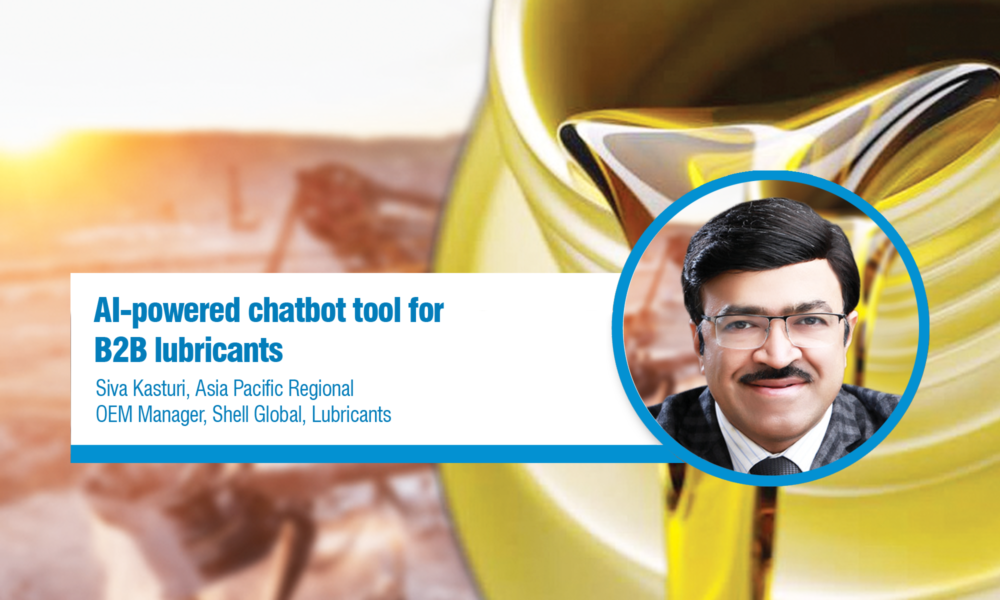AI-powered chatbot tool for B2B lubricants
By OEM Update Editorial October 17, 2019 11:29 am IST
Siva Kasturi, Asia Pacific Regional OEM Manager, Shell Global Lubricants in conversation with OEM Update discusses Shell’s preparedness when India goes all EV and how AI and digitisation has been lending a helping hand to the lubrication industry.
Shell is using solar energy to help power lubricant plant in Europe and Asia, why opting for such an idea?
Solar energy is one of the fastest growing renewable energy sources. As photovoltaic technology advances and production costs decrease, Shell is incorporating solar energy into its portfolio as customer choice drives the shift toward decentralised electricity.
Over the coming decades, the world will need much more energy to meet the growing demand required to ensure quality of life for people across the world. But this is only one part of the story. We need to produce all that energy while emitting much less CO2. This is the challenge we must meet as a society.
We, at Shell, are expanding our solar power generation capability by investing in the development and operation of long-term commercial and industrial solar projects. We need to figure out ways to ensure consumption of minimum amount of carbon-dioxide. Here, Shell recognises the importance of climatic challenges and therefore we are considering changes to drive low carbon use and a change in consumer choice by various offers.
What is shell’s preparedness when it comes to India going EV way?
The technical requirements placed on fluids in hybrids and EVs are much greater than they are in ICE vehicles. Their core job of preventing wear, reducing friction, and being efficient is still essential, but as e-mobility technology advances, so is the role that fluids play in electrical compatibility and thermal management.
The Shell E-Fluids and E-Greases range is designed to effectively and efficiently meet a broad range of performance requirements and is engineered specifically for the high-tech powertrains of electrified vehicles. With the rise of hybrid and electric vehicles, the automotive industry is going through a profound shift. For many of our customers, e-mobility represents some of the biggest engineering and design changes in the industry’s history.
At Shell, we’re working alongside our customers to help manage those challenges and meet the technical requirements placed on fluids in hybrids and electric vehicles. As the leading global lubricants manufacturer for the last 12 years, we have recently developed a new line of fluids for electric vehicles. But we are not stopping here, because as hybrids and electric vehicles continue to deliver a higher level of performance for consumers, we will continue our history of partnership with OEMs to engineer the most advanced, reliable e-fluids in the industry.
How can industrial lubricants help in increasing machine uptime on shopfloor?
As we are aware, the role of lubricant is to reduce friction and offer adequate oil film between any two relative moving components. In addition to friction reduction, the role of lubricant is to reduce the amount of wear that occurs during operation, reduces operating temperatures, minimises corrosion of metal surfaces, and assists in keeping contaminants out of the system.
Lubricants have many properties that can be mixed and matched to meet your operating needs. For example, there are different chemicals that can be added to allow a machine to efficiently run at extreme temperatures. We can also make a lubricant more effective in protecting machine surfaces under extreme pressures.
A recent survey commissioned by Shell in about 8 countries with key decision makers and industry influencers on TCO (total cost of ownership), we had some interesting observations on how effective lubrication can help lower total cost of ownership. We have TCO defined as the total amount spent on industrial equipment, including cost of acquisition and operation over its entire working life, including costs of lost production during equipment downtime. With effective lubrication management, about 30 per cent of total maintenance budget, annually, can be saved by preventing unplanned downtime and frequent breakdowns.
What are the specific challenges that a machine shops/manufacturing sector face in terms of lubricant selection and usage?The specific challenges faced by shop floors and maintenance managers can be many. Few of them can include:
- Storage of product in the right manner as awrong storage can reduce the life of oil
- Lack of understanding to choose the right product for the right application, OEM recommendation or challenge which machine offers
- Not having a comprehensive oil and machine monitoring program
- Ignorance of oil filtration methods, avoiding contamination of water, dust etc.
Shell’s technical experts are fully capable to guide our customers and OEM partners to eliminate many such wrong practices. Regular monitoring is extremely vital and critical to achievelubrication excellence. Predictive maintenance can help sort any issues before they surface and prevent machine downtime. Assessments involving external suppliers such as Shell can bring industry expertise to the table, allowing for quick resolutions and additional knowledge to resolve these challenges.
How is AI and machine learning aiding in analysing and monitoring lubrication oil?
Shell has been an early adopter of Artificial Intelligence (AI), as it attempts to speed up its digital transformation; from machine learning to computer vision, deep learning to virtual assistants in lubricants business as well Shell Lubricants has introduced Shell LubeChat, the first AI-powered chatbot tool for B2B lubricants customers. Shell LubeChat is an online chat robot that is designed to give users around the world easy, real-time access to product support, technical services and lubricants data. Currently, available in the United States, China and India, this service will also be launched in the United Kingdom in the coming weeks and other markets later in the year.
Shell LubeChat can be used across a wide range of businesses and sectors, including general manufacturing, construction, agriculture, power and fleet. Designed to help optimise efficiency for our customers and distributors, Shell LubeChat, alongside the entire suite of Shell Lubricants Services, can help solve day-to-day challenges like obtaining access to information quickly. The platform is equipped to help users in a variety of ways, including finding the right product for their equipment, accessing technical and safety data sheets on Shell Lubricants products, learning through case studies, how others have helped improve their operations with Shell Lubricants products, getting the recommended Shell alternative to other products in the market, and finding authorised distributors closest to them.
Shell recently launched an AI-driven service for its lubricant customers. Shell Virtual Assistant is an interactive one-stop shop on the Shell website where customers and distributors can ask common lubricant-related questions, 24 hours a day, seven days a week. Productivity, machine reliability and energy efficiency are some of the most important aspirations for every end user who owns a machine either stationary rotating equipment or a vehicle.
As we continue to focus on our expertise in lubricants technology and maintain close relationships with equipment manufacturers which have enabled us to develop next generation lubricants for a wide range of industrial sectors and applications, Certainly, AI and digitisation will help us meet these challenges in a far more efficient manner.
With effective lubrication management, about 30 per cent of annual total maintenance budget can be saved by preventing unplanned downtime and frequent breakdowns.
Siva Kasturi, Asia Pacific Regional OEM Manager, Shell Global Lubricants
Cookie Consent
We use cookies to personalize your experience. By continuing to visit this website you agree to our Terms & Conditions, Privacy Policy and Cookie Policy.


















